Last time I had hurricanes, a microburst, flooding and Florida summer temperatures to use as my gardening death stool pigeons. This time? Nothing. Just my pure lack of skill. To say I'm disheartened is an understatement.
Remember the zucchini and watermelon that I grew in small pots and transplanted to the garden a week or so ago? Yup. Already dead or dying. Last year I bought seedlings from the Gardening Center - zucchini, yellow squash, cucumber, watermelon - and within 2 weeks every single one of them was dead.
And here we go again. Exactly the same scenario as last year. These photos could have been taken last year, but they were taken this morning.
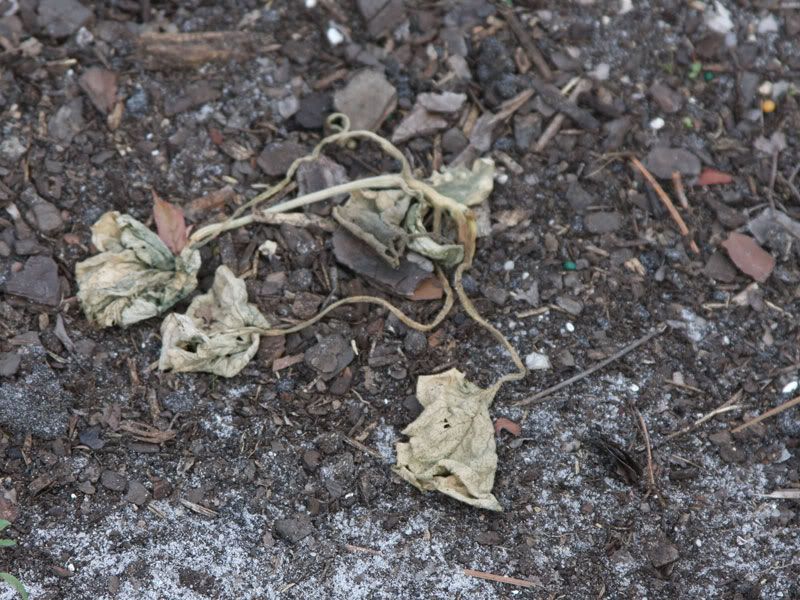
Here is how they looked on April 2nd - the day they were transplanted.
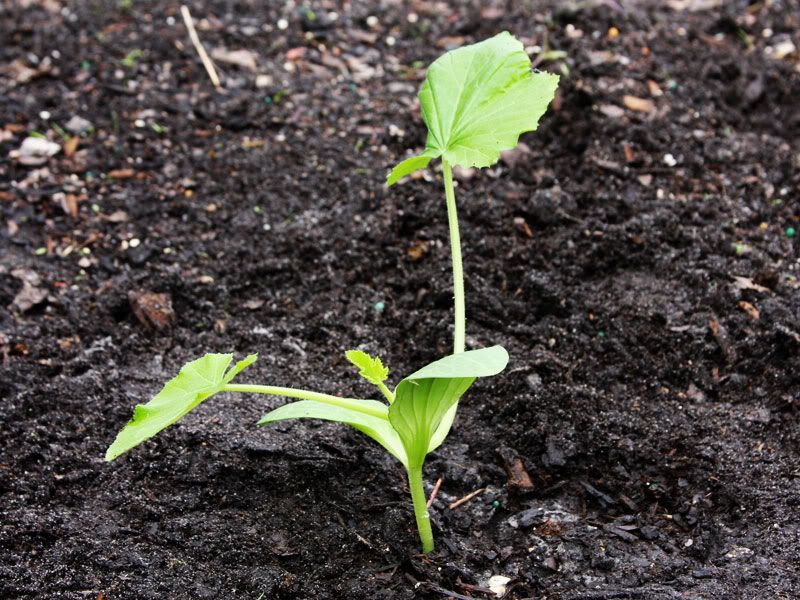
Granted we had that super-windy day last week and a few flopped over.
But look at them on April 13, only 11 days after transplant!! Out of 6 transplants, 4 are dead and 2 are a bit yellower than they should be.
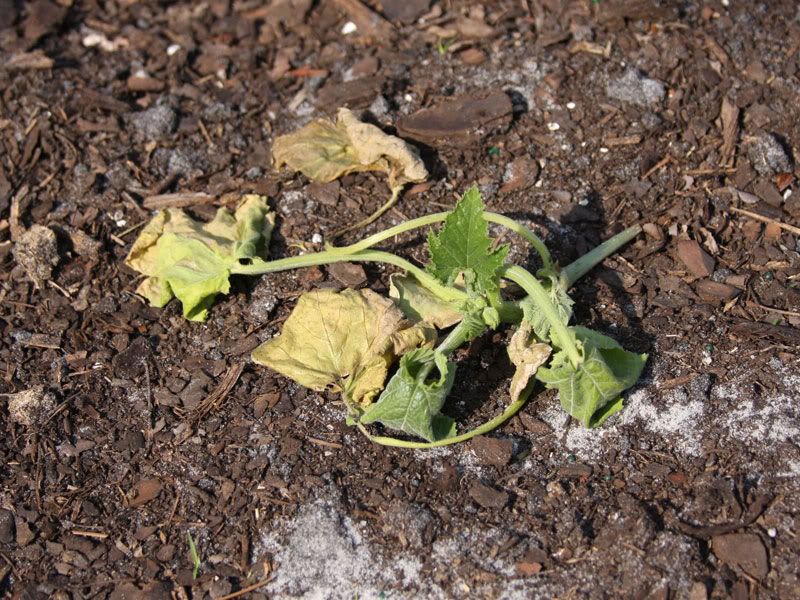
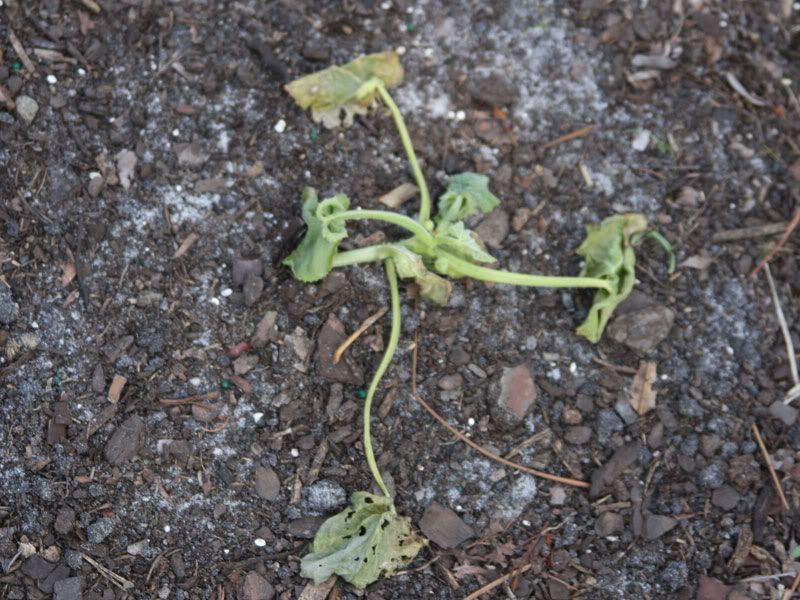
It's so flipping frustrating that I don't know why these plants die in my garden! If I didn't learn anything from their deaths with my last planting and the same thing is happening again, then now what? If I don't figure out what I'm doing wrong, I'm doomed to repeat the same mistakes each time.
Here is the one that is clinging to life, but yellowing and I know it'll be a gonner within the next day or two.
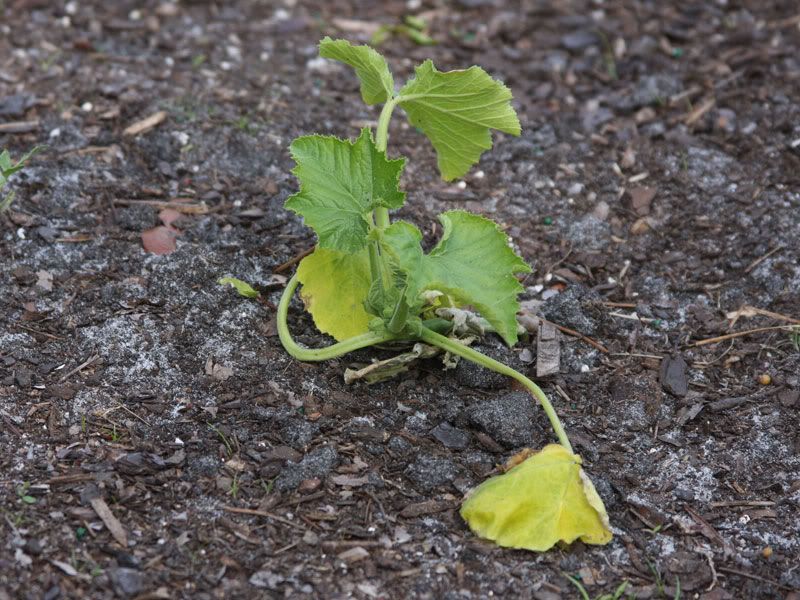
And here is the only green one left. But let's not fool ourselves into thinking that this plant has tricked the reaper. He's a-knockin' and my little green buddy, you're next.
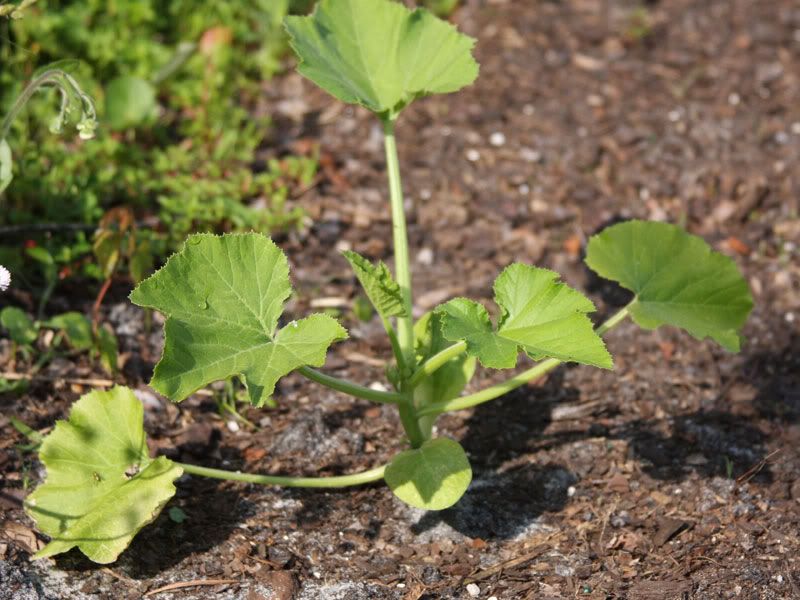
I have a handful of seedlings on the patio that are ready to be planted. But obviously, I'm hesitant to toss their bodies into the garden of death as sacrificial lambs to appease the angry gardening gods who have set up shop in my backyard. My leeks are doing okay - my tomatoes are all right - the corn and radishes seem to be okay, but I can't get zucchini, yellow squash, cucumber or watermelon to last two weeks in my garden. WHY?!?!?
The PH has been tested and is within normal range. The garden is watered a bit every other day. The soil seems okay...Anyone have advice for me? I'm putting out an official Gardening S.O.S. HELP!!

















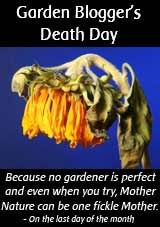


21 comments:
Kate - this better not be another (late) April Fool's joke.
Sorry, can't help you - I'm just as inexperienced as you. :(
Alas - no joke.
My husband has started calling me the Grim Reaper. He hums Taps whenever he sees me wandering out to the garden.
:o(
Hi Kate,
Is that mulch in your garden? Mulch can cause acidic soil which in itself is not bad but may need some lime to neutralize. Also, what fertilizer are you using? The yellowing looks like a mineral deficiency.
What was the composition of your plot before you planted? Sand, compost, manure?
and do you have a sprinkler system for adequate watering?
Dig up your last plant and see if the roots have been eaten on, also some pests attack the root system.
If it were me and you want to still get in on this years planting season. I would put weed cloth down over your garden, build an elevated bed 6-12" high and fill with compost and store planting soil from a garden center. Sometimes you can get a deal on a trailer full. I knowing your soil is good and keep enriching it with compost between plantings, and cover in black plastic between plantings to kill off the nematodes.
Sorry for the book, but I know how frustrating watching all your effort die.
Kate - watering every other day in a traditional style garden as yours is way too frequent. Try watering deeply every 5-6 days, instead. I think this will correct the problem. Go get some more transplants, and watch the fertilizer amounts! :-)
Kate, I just noticed the white looking stuff on the soil around the dead plants....what is it?
Kate, looks like downy mildew. One of the worst culprits because of our warm, humid weather. Another one that we have to deal with is cucumber mosiac. But, I'm thinking it's the mildew. Hope this helps. :)
Leisa - I didn't put down mulch specifically. When we started the garden last year we went down to a big supplier and bought a trailer-full of organic gardening soil. It came with bits of mulch in it. With the rains the mulchy bits do float to the top a bit, but it's not seperate mulch that I layed down.
Composition of soil was: organic top soil, some horse manure and our local sandy FL soil that was there when we dug up the grass.
Watering: We do have an automatic sprinkler system that waters for 15 min's every other morning. We switched to this because last year I forgot and left the sprinkler on a few times for 13 hrs straight.
EG - when the temperature gets up in the 90s, the plants start to wilt by mid-afternoon if they don't get water. If I leave it a few days between watering, they start to turn brown. Our local extension office told us that every other day in FL can keep the plants alive in the heat. I keep reading about deep watering, but after a couple of days of a long watering session the plants always seem to start to shivel, so I don't know...
And white stuff on the soil? No clue. Sand maybe?
Dani - I wondered about downy mildew last time everything died. The plants literally go from green to yellow to brown to dead in about 3 days.
I'm not quitting, but this sort of thing doesn't make you want to keep replanting. Maybe I can dig up a plant and put it in a bag with some soil and see if I can talk the hubby into taking it down to the extension office.
EG - you said "watch the fertilizer amounts" - but I didn't get a chance to fertilize these. I put down horse poo a few weeks ago and tilled it in, and I do a bit of Miracle Gro every 10 days, but these seedlings didn't live long enough to see any Miracle Gro.
Kate, the University of Florida IFAS extension has a large database, this might be able to help.
Hi Kate! I know you live in FL so the temp thing may not be an issue, but it is possible these transplants came straight from grower and weren't hardened off properly to get used to your humidity and light? I don't think the mulch should be an issue since I have bits mixed in with mine as well and haven't had a problem. That wilting looks environmental, light, too much water, cold snap? I agree with the other poster, try at least one raised bed if you don't have any, and see if you still have a problem. Mine are all raised beds and filled with pure compost - no garden soil, and they do well here in the VA humid summers. So sad...I really wish you well and want you to be rewarded for all your efforts! Good luck to you. I have some pics of my raised beds on my site so you can see how much stuff I cram in mine, lol!
Erin - yeah, I'm thinking I might have to try the raised beds... but we are trying to save money this year and buying lumber and screws and more soil isn't exactly in that plan. We already spent a ton on chicken accessories - LOL.
The transplants I bought last year are on racks outside in the local garden center, so they spent a few weeks in the FL heat and humidity before coming to my house.
No cold snaps recently. It does get down into the 60s at night, which feels cold to me, but I don't think that's too cold for the plants.
It's something about the type of plant. It's cucumbers, squashes, melons, etc. The tomatoes grow - the peanuts grew fine last time - I had some success with green bell peppers - my corn and leeks are doing okay.
I checked out your blog BTW and it's great! Thanks!
Ok I'm a northern gardener but I'll weigh in. Try planting seed instead of plants. At the very least it is cheaper if it fails ;> but cucurbits hate root disturbance and they are weaker after they get transplanted (so can be killed by whatever it is that's killing them more easily). If you must do transplants, do it yourself in newspaper pots (not peat pots which restrict their roots) and transplant them as soon as you see the first true leaf, which is fast.
We don't get a lot of downy mildew up here. It dies over the winter and has to work its way up from the south. We do get a lot of other mildews, and it helps a lot to spray. Last year I sprayed every two weeks with an aspirin, worm tea mixture. The alternating weeks I sprayed with Serenade (organic spray that contains beneficial bacteria). We are very humid up here and get lots of mildews. Everything lived a lot longer with that spray regimen - especially the cucurbits which usually bite the dust here because of powdery mildew.
I haven't seen a question on this part: is the horse manure well aged to the point that it's safe to put on the garden. If it's not ready it can burn the plants.
I also agree with the horse manure question.
As for the cost of raised beds, try going to lawn mower shops and seeing if they have any pallets. The bigger mowers are shipped on large pallets that often have new 2x4's. Just a thought for free wood, a few nails, and a coat of white paint or au naturale and there you go!
Oh, and the white in the pics just looks like Florida sand.
It was old black manure from the bottom of the poo pile - about 3 years old I think? The corn, tomatoes, leeks, radishes are all doing fine in the same soil.
Maybe I'll look into this raised bed thing... buying the soil too... ugh... (just down about it all...)
I feel so bad when I see plants fail - all the time and effort and hopes and dreams! I read somewhere about the zucchini family's roots being very sensitive as well, and some guy's blog (don't remember which one) said that he put out transplants vs. direct seed, and the direct seeded ones were more vigorous than the transplanted ones even though the transplants had a head start. So good luck - we haven't planted our seeds yet and I am crossing my fingers!
gardening without skills---You sound so frustrated with your bad luck, and I would feel the same. It appears that you have a couple of problems going on. The third picture shows a plant cut at ground level. Cutworms do this. Now the other pictures look like not enough water with plants in poor soil. The plants that you are trying to grow thrive in moist compost, less sand, and more mulch.
I grow my veggies in a sunken garden--opposite to a raised bed. If you wanted to see pictures of my thriving garden go back to the Fl. Gardening forum and check out my thread called "My Garden Got Bigger", last updated a couple of weeks ago.
All of the cukes and squashes in my garden were started in small pots before being put in the garden. The cukes and squashes are setting fruits now. Cukes and squashes are a challenge for beginning gardeners. May I suggest different types of beans? Beans are much easier.
You may possibly have a virus in your soil that is specific to cucurbits (squash and melon type plants). If that is the case you can try to find out what types of diseases create problems like that in your area (cooperative extension could help with that) and plant varieties resistant to those diseases. You could try planting them in a different part of your garden and see if you have the same problem. You could try one or two in large pots and see if you still have the problem. If you don't have a problem when you grow them in pots, than you probably have something in the soil that is killing the plants.
I agree with Daphne...try seed instead! I plant my cukes from seed, some plants hate to be transplanted and do better from seed. Also, with my cukes especially, I cut up toilet paper/paper towel cardboard rolls into 1-2" pieces and slip them over the newly emerged seedlings...works like a charm for cutworm problems. As for the raised beds, try one from whatever you have on hand, or can score from someone's "curb pile"...I have a friend that used old dresser drawers with the bottoms cut out for small beds, lol!
Ok, I am not an expert BUT have a few suggestions for you .. switch to pine straw if you want to mulch in the veggie garden. About 4 weeks before you want to plant your spring garden SOLARIZE the soil because it will kill all the nasties in there. To solarize hoe or till up the the area to get rid of all weeds. Turn the soil and wet it down really good, wait 24 hoours then cover with a clear 3 to 6 mil plastic and leave on for 4 weeks. remove the plastic and let soil cool for a few days and plant away.
ALSO watering in Florida is totally different snimsl. If it is HOT then you need to deep water or water every day. The Brown and wilted leaves could be a Bacterial Wilt which attacks Squashes, eggplant, cabbage etc. Cut the stem to check to see if they ooze (YUCK how discusting LOL)also test your garden for lack of minerals ex: Iron and Magnesium.
Post a Comment